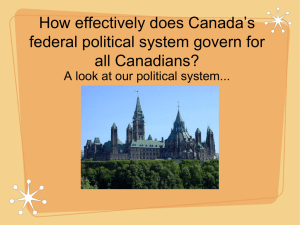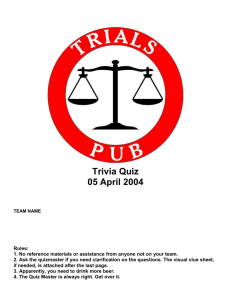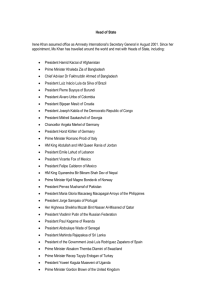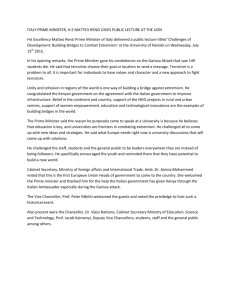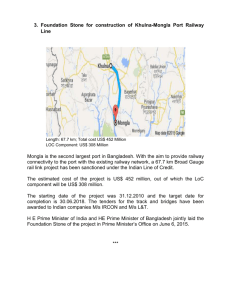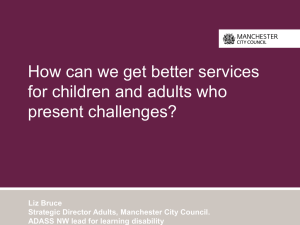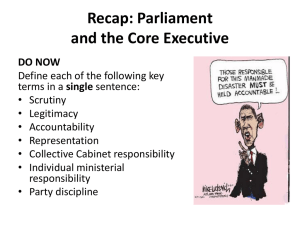Chapter Nine notes
advertisement
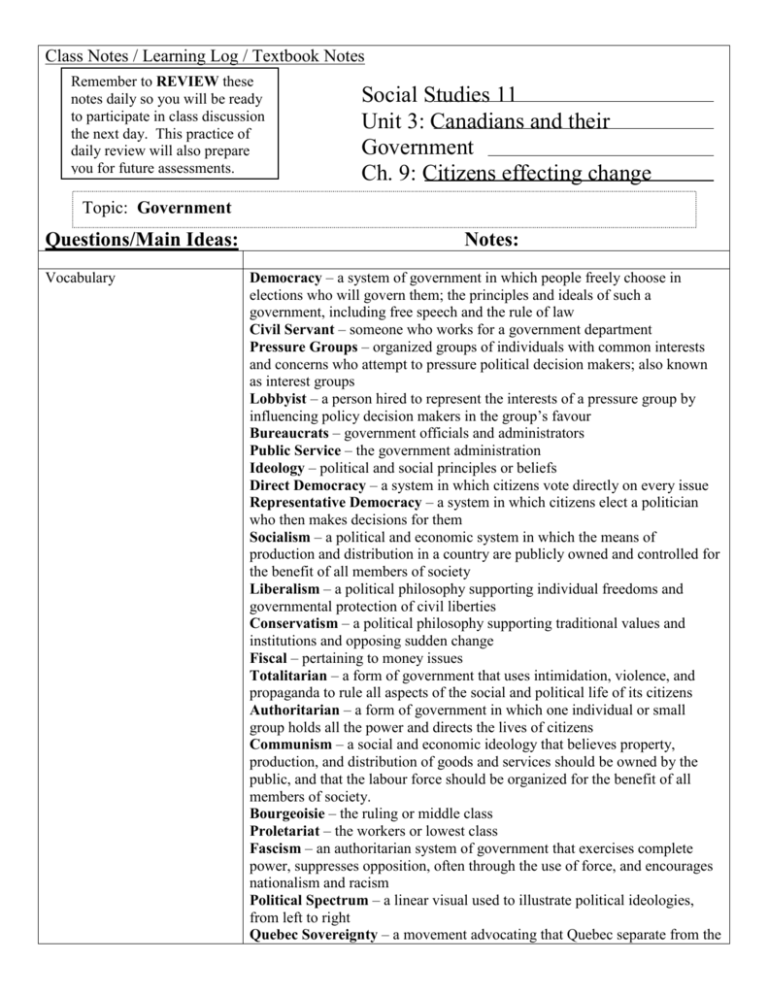
Class Notes / Learning Log / Textbook Notes Remember to REVIEW these notes daily so you will be ready to participate in class discussion the next day. This practice of daily review will also prepare you for future assessments. Social Studies 11 Unit 3: Canadians and their Government Ch. 9: Citizens effecting change Topic: Government Questions/Main Ideas: Vocabulary Notes: Democracy – a system of government in which people freely choose in elections who will govern them; the principles and ideals of such a government, including free speech and the rule of law Civil Servant – someone who works for a government department Pressure Groups – organized groups of individuals with common interests and concerns who attempt to pressure political decision makers; also known as interest groups Lobbyist – a person hired to represent the interests of a pressure group by influencing policy decision makers in the group’s favour Bureaucrats – government officials and administrators Public Service – the government administration Ideology – political and social principles or beliefs Direct Democracy – a system in which citizens vote directly on every issue Representative Democracy – a system in which citizens elect a politician who then makes decisions for them Socialism – a political and economic system in which the means of production and distribution in a country are publicly owned and controlled for the benefit of all members of society Liberalism – a political philosophy supporting individual freedoms and governmental protection of civil liberties Conservatism – a political philosophy supporting traditional values and institutions and opposing sudden change Fiscal – pertaining to money issues Totalitarian – a form of government that uses intimidation, violence, and propaganda to rule all aspects of the social and political life of its citizens Authoritarian – a form of government in which one individual or small group holds all the power and directs the lives of citizens Communism – a social and economic ideology that believes property, production, and distribution of goods and services should be owned by the public, and that the labour force should be organized for the benefit of all members of society. Bourgeoisie – the ruling or middle class Proletariat – the workers or lowest class Fascism – an authoritarian system of government that exercises complete power, suppresses opposition, often through the use of force, and encourages nationalism and racism Political Spectrum – a linear visual used to illustrate political ideologies, from left to right Quebec Sovereignty – a movement advocating that Quebec separate from the Vocabulary (continued) rest of Canada and become a country of its own Libertarianism – a political ideology that supports maximum individual freedom and minimal government involvement in the lives of its citizens Party Platform – a list of priorities and a plan for governing published by a political party Non-governmental organizations (NGOs) – local, national or international groups that work independently of government on issues such as health, the environment or human rights Patronage – a favour, often a government position, given in return for political support Populism – a political movement that advocates the interests of ordinary people Elite – a group of people who hold power Polarize – to go in opposite directions Partisan – loyalty to a party or cause Senate – the second legislative body in Parliament consisting of appointed members whose role is to give sober second thought to the passage of bills Cabinet – the group of ministers chosen by the prime minister who decide government policy; each Cabinet minister has a responsibility for a particular department House of Commons – the first legislative body of Parliament whose members are elected ad valorem tax – a tax that is proportional to the value of goods Excise tax – an added tax on certain goods produced or sold in the country, for example, alcohol, gas and tobacco Surplus – the amount of money remaining when a government takes in more than it spends Deficit – the amount of money a government owes when it takes in less money than it spends Civil service – the body of people who work in government administration Bureaucracy – officials and administrators who carry out the work of government Office of the Prime Minister (PMO) – the prime minister’s political advisors and staff Privy Council Office (PCO) – the office that organizes the work of the Cabinet Cabinet solidarity – the custom that Cabinet members must not show disagreement with government policies Order-in-Council – an order signed by the Governor General (or the Lieutenant-Governor in the provinces) on the advice of the prime minister (or premier) and Cabinet; allows laws and regulations to be passed without a parliamentary vote Royal assent – the final stage a bill must complete before it is passed into law in which the Governor General (or Lieutenant-Governor in the provinces) signs or grants approval for the bill Lieutenant-Governor – the provincial representative of the Crown appointed by the Governor General Party whip – a member of the legislature assigned the specific role of ensuring all members of his or her party are present in the legislature to support party interests Party discipline – all party members voting the same way, as one voice Free vote – members voting according to their own conscience Vocabulary (continued) Backbenchers – members of a legislature who are not Cabinet ministers, party leaders, or opposition critics Private member’s bill – a bill introduced into the legislature by a member of the legislature who is not a member of the Cabinet Majority government – a government in which the ruling party has more than half of the total number of seats in the legislature Minority government – a government in which the ruling party has more seats than any other party, but the other parties combined have more seats than the government Status quo – the existing order of things Coalition – a formal alliance of political parties Prorogue parliament – to suspend Parliament for a period of time upon the prime minister’s request to the Governor General Dissolve parliament (dissolution) – to call an end to a sitting Parliament, at the request of the prime minister (or premier) to the Governor General (or Lieutenant-Governor in the provinces); followed by a general election Brand recognition – awareness by the general public of characteristics associated with a particular product, business or person (in the case of politics) Spin Doctors – people who publicize in a positive way the words and actions of politicians Civil disobedience – the act of intentionally breaking the law while protesting against laws one considers unjust Apartheid – an official policy of racial segregation involving political, legal and economic discrimination against non-whites Nelson Mandela – South-African anti-apartheid activist who resorted to violence only as a last resort after many years of peaceful protests with no progress Mohandas Gandhi – Indian political and spiritual leader who used nonviolent civil disobedience to protest unjust taxation of the poor and discrimination against women and the underprivileged Clayoquot Sound – Canada’s largest example of civil disobedience. The 1993 anti-logging protests at Clayoquot Sound resulted in the largest mass arrests in BC history Martin Luther King Jr. – U.S. civil rights activist who embraced nonviolent civil disobedience in his quest for justice and ultimately died for his cause Karl Marx – political theorist of the 19th century who believed that the ruling class should be overthrown by the working class. Author of the Communist Manifesto, published in 1848 Friedrich Engels – political theorist of the 19th century who believed that the ruling class should be overthrown by the working class. Author of the Communist Manifesto, published in 1848 Communist Manifesto – political ideology written by Karl Marx and Friedrich Engels in 1848 Mussolini – Developed the fascist ideology as leader of Italy after the First World War Conservative Party – current federal government in Canada. Leader is Stephen Harper – on the classic political spectrum, falls on the right to the centre-right. Liberal Party – governed Canada for most of the 20th century. Leader is Bob Rae – considered to be centre-left to centre on the political spectrum New Democratic Party (NDP) – official opposition in federal parliament. Leader is Nycole Turmel – party would fall somewhere between the left and centre-left – further to the left than the Liberals Bloc Quebecois – the vast majority of the Bloc’s members and supporters advocate for Quebec to separate from Canada and become an independent nation. Nominates candidates only in Quebec – leader is Vivian Barbot – the party falls on the left wing of the political spectrum Green Party – Leader is Elizabeth May – as of 2009, the Greens are polling an average of 8 – 12%. While technically Greens have factions that fall on all sides of the political spectrum, the Green Party of Canada’s ideology is widely considered to be left wing. Romeo Dallaire – a former general who led the United Nations force during the Rwandan genocide in 1994 and later wrote about the tragedy in his book Shake Hands with the Devil. Now a human rights activist, speaking out on issues such as genocide and child soldiers. He has also been a civil servant and has received many honorary degrees and prizes. General Dallaire was appointed to the Senate as a Liberal in 2005 by Prime Minister Paul Martin. Legislative Branch – makes the laws Executive Branch – carries out the laws Judicial Branch – administers the courts and interprets and enforces the laws Governor General – currently David Johnston – the person who represents the British crown in Canada Queen – head of state for Canada – currently Queen Elizabeth II Prime Minister – The leader of the party that wins a federal election by having the greatest number of representatives elected to the House of Commons – currently Stephen Harper (Conservative) Premier – the leader of the party that wins a provincial election by having the greatest number of representatives elected to the Legislative Assembly – currently Christy Clark (Liberal) in BC Speaker – responsible for applying and enforcing the rules of the commons procedure – must be neutral and impartial Mace – The ceremonial mace is a highly ornamented staff of metal or wood, carried before a sovereign or other high official in civic ceremonies by a mace-bearer, intended to represent the official's authority. The mace, as used today, derives from the original mace used as a weapon. Processions often feature maces, as on parliamentary or formal academic occasions Page – The pages are responsible for providing a range of services needed to ensure the effective operation of Parliament and its committees in keeping with the tradition of impartiality and non-partisanship Hansard – is the name of the printed transcripts of parliamentary debates in the Westminster system of government. It is named after Thomas Curson Hansard, an early printer and publisher of these transcripts Sergeant-At-Arms – an officer appointed by a deliberative body, usually a legislature, to keep order during its meetings Constituents – a voter in a riding Referendum – a direct vote in which everyone is asked to either accept or reject a particular proposal Electoral District/Riding/Constituency – a geographical area of a given size or population used as a unit in elections Chief Electoral Officer – an independent officer of Parliament responsible for federal elections Voter Apathy – reluctance or lack of interest in voting Nomination – choosing a candidate to run for office Pollsters – people who conduct public opinion polls Polling Stations – locations where citizens in a riding vote Advance polls – locations where people can vote in advance of election day Electoral Officers – Elections Canada officials who count the votes By-election – an election held in a riding to fill a vacancy First-past-the-post (FPTP) – an electoral system in which the candidate who has more votes than any other candidate wins Single transferable vote (STV) – an electoral system in which parties gain seats by the proportion of votes won in large electoral districts Compulsory Voting – citizens are required, by law, to vote in elections. Those who fail to do so may be fined or jailed Describe ways that Canadians can participate in democracy between elections. (page 290) Active citizenship means that we need to learn how to make the government responsive to our needs. If you think the government should do more to protect the environment, a new social program should be introduced or the voting age for election should be lowered, what can you do to make your goal a reality? You could write letters to the editor of a widely read newspaper, write a letter to the government or opposition, participate in radio phone-in shows, start a blog, speak to someone who works in a government department, join the youth wing of a political party or join a group of likeminded people that is pressuring the government. These are ways to become more involved in the democratic process. How do lobbyists and pressure groups influence government decisions and how can this become dangerous to a democratic society? (page 291) Special interest groups are called pressure groups and are organized to influence government policies and decisions. These groups are made up of people who share a specific viewpoint and want to promote their common interest. Institutionalized pressure groups, such as the Assembly of First Nations, are well-established and have formal organizations. Issue-oriented groups are not permanent because their purpose is to accomplish a specific goal and usually disband once their goal is reached. Lobbyists a people paid to try to influence key decision makers. They get contracts from the companies or groups they serve. The danger with lobbying is that insiders can persuade governments to put in place policies that are not necessarily in the public interest. Some argue that if government can be influenced too greatly by well-organized minority interest groups, then the wishes of the majority may not be heard – or even sought. Interest groups and individuals can also use the courts to influence government and make change happen since the courts must interpret laws within the context of the Constitution and the Charter of Rights and Freedoms. Describe the role the media plays in politics. (page 294) People often try to get media attention for a cause or to enhance their political profile. Social media sites like Facebook have become a new form of public media. Traditional media like tv, radio, magazines and newspapers are still very important. Without a media presence, a politician would not have the brand recognition necessary to get votes. The media also lets everyone know how citizens are feeling about issues and government programs. The media gives candidates very wide exposure but they can also magnify faults or political gaffes that occur. Political parties and candidates have websites to get their message out and to gather support. Political parties hire spin doctors to coach candidates on what to say and make sure they look good in the media. Briefly explain the principles of civil disobedience. (page 295) Civil disobedience is the act of intentionally breaking the law while protesting laws one considers unjust. This form of protest has been used by some of the greatest moral leaders of our time including Indian political and spiritual leader Mohandas Gandhi, U.S. civil rights activist Martin Luther King Jr., and South-African anti-apartheid activist Nelson Mandela. Civil disobedience is warranted only when the law itself causes significant harm. Those who choose to practice civil disobedience must be willing to face the consequences of their actions. There are 3 principles of civil disobedience: 1. Civil disobedience should not involve violence. 2. Civil disobedience should be directed against laws that are seriously harmful 3. Civil disobedience requires taking responsibility for one’s actions. Willingness to face punishment shows the strength of one’s beliefs. What is the difference between direct democracy and representative democracy? (page 297) In direct democracy, every eligible citizen participates directly by voting on all decisions that affect society. In representative democracy, citizens allow elected representatives to make decisions on their behalf. Draw up a chart showing the main features of each ideology: socialism, liberalism, conservatism, fascism and communism. (page 297) Socialism – early socialism was a backlash against the industrial revolution and the resulting capitalist laissez-faire economy. Socialists believe that the government should control important parts of the economy and major industries. Liberalism – began as a political theory that favoured individual freedom above all else. This belief was tied to the right to own property and to the conviction that the government should have minimal involvement in the lives of citizens so as not to infringe on people’s liberty. In the 20th century, liberalism shifted its focus from property and individual rights and evolved into a belief that the government should intervene to regulate the economy. Liberalism supports government intervention to maintain basic standards of living for all people and to protect the rights of individuals and groups. Conservatism – is less of an ideology that a stance taken against change, innovation and reform. It is for maintaining established political and social institutions and values. It supports laissez-faire capitalism or minimal government intervention in the economy. In the late 20th century, many conservatives came to believe that government has a role in encouraging traditional behaviours and they opposed same-sex marriage and abortion. Fiscal conservatives support reductions in government spending and a balanced budget. Communism – based on the Communist Manifesto written by Karl Marx and Friedrich Engels who believed that the ruling class should be overthrown by the working class. Marx believed that a revolution by the working class (or proletariat) would result in a classless society in which all property would be collectively owned. Communist governments maintained their power through propaganda, secret police and government control of its citizens. Fascism – is about the importance of the state and the responsibility of people to serve it. They believe that a country is an organic community needing strong leadership, a collective identity and military strength. They emphasize nationalism and militarism. War is glorified. Political opposition or individual freedom is forbidden. Fascism started after the First World War in Italy under the leadership of Benito Mussolini. Germany under the Nazis was another fascist state. What is patronage? (page 301) Refers to the giving, by premiers and prime ministers, of offices and rewards in return for loyalty or favours to the party. A large part of government is deal making and it is very difficult to make deals with others if you have nothing to offer in return. A prime minister has a lot to offer in the way of patronage – Senate seats, ambassadorships, committee chairpersonships. Describe the responsibilities of the 3 branches of government: Legislative, Executive, Judicial. (page 304) The executive and legislative branches of the federal government make and administer the laws and regulations of the country. The judicial branch administers the courts and interprets and enforces the laws. What is the Senate and how do you become a Senator? (see class notes) The Senate is part of the Legislative Branch of the government. It is also known as the Upper House. The 105 members are appointed by the Governor General on the advice of the Prime Minister. Their role is to provide a final check on the legislation passed in the House of Commons – give “sober second thought” to all bills. The seats are allotted regionally on the basis of population. If a seat becomes vacant, a Prime Minister often gives it to a supporter of his party. Senators must live in the province/territory they represent and can serve until they are 75 years old. Their other purpose is to “polish” legislation that has come from the House of Commons to make sure the wording is perfect. What is the role of Cabinet Ministers? (page 306) The prime minister, or premier in the provinces, is the chief minister of the Crown and the head of the Cabinet. The prime minister and Cabinet form the executive branch of government. The prime minister can choose and discipline Cabinet members, directs the activities of the legislature, has the right to be consulted on all important Cabinet decisions, controls appointments to the Senate and judiciary, and can recommend Parliament be adjourned or dissolved and an election called. Publicly, Cabinet ministers must display full support for the prime minister and the decisions of the government. This show of strength is called Cabinet solidarity. The Cabinet initiates laws and its ministers are responsible for the smooth running of government and the spending of public money. Cabinet ministers usually are part of the governing party and have a seat in the House of Commons. Each Cabinet minister is responsible for a department of the government, called a portfolio. The minister is held responsible for everything that happens in the department – this is called ministerial responsibility and they must resign if serious breaches of office take place. The minister introduces new legislation pertaining to the ministry and guides it through the House. What are Orders-in-Council and when would they be used? (page 307) Orders-in-Council make laws or regulations without the necessity of a parliament vote. They are used for Senate appointments, necessary changes in law, and in case of real or perceived emergencies. They may seem undemocratic but are part of parliamentary tradition. Governments are wise to use them sparingly. What steps does a bill have to go through in order to become a law? (page 308) A bill becomes a law in the federal parliament after it goes through three readings in the House of Commons, is amended by a committee, has three readings in the Senate, is signed by the Governor General (referred to as royal assent), and is proclaimed. First Reading – the bill is introduced to the House of Commons, then printed and distributed to Members of Parliament. The bill is not debated at this stage. Second Reading – the principle and purpose of the bill is debated in the House. Committee Stage – a committee examines the bill clause by clause. It may make amendments to the bill. Report Stage – committee members report back to the House. The House reviews amendments to the bill Third Reading – MPs have a final opportunity to review and amend the bill. Senate – the bill is sent to the Senate where it follows a similar process. If it is a provincial bill, this stage is skipped. Royal Assent – the Governor General of Canada gives the bill royal assent, meaning that it becomes law. If it is a provincial or territorial bill, the Lieutenant-Governor of the province or territory grants royal assent. How is party discipline enforced? (page 309) Parties make sure their members vote as the party wishes and this is done through the whip system. The party whip makes sure that the party members are in the House of Commons (or legislature for provinces) for important votes and vote as the party requires. Whips have various ways to enforce discipline but mostly they persuade their fellow party members to put the interests of the party first. What is a minority government and what makes them vulnerable? (page 310) A minority government is one in which the governing party has more seats than any other party but the other parties combined have more seats than the government. A minority government has to be careful not to introduce legislation that will not pass. Votes on budgets and other money bills are votes of confidence and the government traditionally resigns when it loses such a vote. A party in minority cannot fully implement its policies or make important changes because to do so would risk defeat. Minority governments tend to maintain the status quo even if change would be better for the country. Why would parliament be prorogued? (page 311) A government can use prorogation to get itself out of a jam on a particular issue, to kill legislation it has problems with, to shuffle the membership of committees, and to otherwise keep itself in power. What is a party platform? (page 300) A party platform is a list of priorities and a plan for governing published by a political party. It helps the public understand what the party stands for and it reminds party members about goals and core beliefs. Explain the pros and cons of our voting system: first-pastthe-post. (page 317) In this system, the winner does not necessarily have to win a majority of the votes cast; they simply have to win more votes than any other candidate. The system is simple and straightforward. Supporters of this system also say that it means there is usually a clear winner of elections and minority governments don’t often happen. However, the result does not always represent the wishes of the majority of voters. How do you feel about compulsory voting? Should we have this in Canada? Why or why not? (page 318) In countries with compulsory voting, citizens must vote or face fines or jail. If there is no compulsory voting, we allow uninterested people to throw away rights that have taken centuries to achieve simply because people are not interested enough to vote. Voter apathy is a serious problem for democracies. Compulsory voting is a measure designed to ensure citizens accept their responsibility to maintain democracy. Supporters claim that compulsory voting is really not different than serving on juries or paying taxes and it makes certain that all parts of the electorate are represented and that it increases interest in issues and in politics in general. Questions/Main Ideas: Name the 3 levels of government and provide examples of what they are responsible for. (see class notes) Notes: Federal Government – defense (military), regulation of trade and commerce, citizenship, taxation (GST), currency and coins, native peoples and native reserves, postal service, patents and copyright, marriage and divorce, fisheries Provincial Government – education, hospitals and charities, licenses (driving and fishing), private property and Civil law, direct taxation (income tax and sales tax), management of natural resources (forests and electrical energy), local public works (roads and canals), courts and administration of justice Municipal Government – water and sewer service, public transit, fire and police protection and ambulance service, licensing and inspection (houses), street lights, sidewalks and local roads, public health services, garbage collection, matters of purely local concern What is the duty of the Governor General? (see class notes) Canada’s current Governor General is David Johnston. His duties include: - Giving Royal Assent to bills passed by the House of Commons and the Senate in order to establish them as laws - Speech from the throne at the opening of a session of Parliament - Presides over the swearing-in of the prime minister, chief justice of the Supreme Court, and cabinet ministers Summary, Reflection, Analysis

